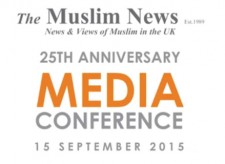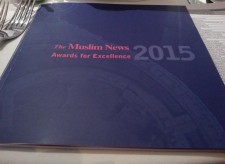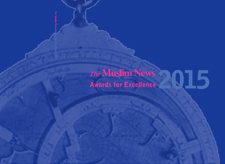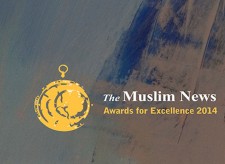(Photo courtsey of Oslobodjenje)
Bosnia and Herzegovina’s former Minister of Education, Science, Culture & Sports, Dr Enes Karić, talks with the Editor of The Muslim News, Ahmed J Versi, about his country’s worst political crisis since its 1990s war, the resurgence of far-right Serbian and Croatian nationalism in the country, the ramifications of the Dayton Peace Accords, as well as the prevalence of Islamophobia in Bosnia and the region.
The recent political crisis in Bosnia and Herzegovina has once again thrust the country into the global spotlight, with experts claiming it’s reaching the breaking point of an armed conflict, exactly what’s happening?
The situation, at least to some extent, is reminiscent of that in 1990-91, when conflicts between Serbs (Orthodox) and Croats (Catholics) were starting to emerge in Croatia. I remember in 1991, the dead soldiers of the Yugoslav People’s Army were brought from Croatia in metal coffins. There were funerals almost everywhere in the then socialist Yugoslavia. For now, there are no armed conflicts in Bosnia and Herzegovina, although fear is spreading, as is distrust.
Why has the political crisis culminated?
The uninformed think that the law banning genocide denial, imposed by High Representative Valentin Inzko in July, is the main cause of this crisis. That is not the case. The imposition of that law was used by Serbian nationalists as an excuse to culminate the crisis by withdrawing the Serbian politicians, who work against the country, from the institutions of BiH They have shown, like so many times before, their arrogance towards this country that pays their salaries.
The facts show that two nationalist politics have openly, directly and jointly acted against Bosnia and Herzegovina as a state, i.e. the Serbian and to a lesser yet sufficiently dangerous extent the Croatian.
Every event that favours these two detestable policies is being used against this country. For example, over the past four years, a large number of refugees from Asia and Africa have flowed into Bosnia and Herzegovina.
The fact that these poor refugees are mostly Muslim was used to destabilise Bosnia and Herzegovina as a state. In the regions of Bosnia and Herzegovina where these two nationalist politics make decisions or hold a majority of totalitarian rule, refugee camps were not allowed. Instead, thousands of refugees were pushed mostly to cantons where Muslims live. Nothing could be done about it.
When you say “two nationalist politics, Serbian and Croatian”, are you referring to parties in Bosnia and Herzegovina or Serbia and Croatia?
Both of these politics in Bosnia and Herzegovina work in coherence and synchronisation with their parent politics in Belgrade and Zagreb. When it comes to the destruction of BiH, there is a very high level of agreement among them. These two nationalist politics are advocating that BiH as a state be made meaningless in the long run and its road to EU or NATO membership be thwarted.
Due to their detestable role in the 1992-1995 anti-Bosnian war, the initiators and implementers of these nationalist politics were convicted by the International Criminal Tribunal for the former Yugoslavia (ICTY) for a crime called Joint Criminal Enterprise. New outgrowths of these nationalist politics exist, mutate intensely and continue to act.
The International Court of Justice (ICJ) in The Hague ruled in 2007 that genocide was committed in Srebrenica by parastate mechanisms of Serbian politics from 1992-1995. The army and police of the Republika Srpska were mentioned in the judgment as those who committed genocide, that judgment is one, although the most important, in a series of The Hague judgments for genocide. Namely, in the last ten years or so, the ICTY has also handed down several judgments for genocide committed against Bosnian Muslims. I primarily mean the judgments against war criminals Radovan Karadžić and Ratko Mladić.
Have relations in Bosnia and Herzegovinarelaxed since the 1995 Dayton Peace Accords?
There was relaxation, namely, the very absence of war and killings after the signing of the Dayton Peace Accords in November 1995. Then the international community (i.e., the US and EU), through the High Representative (OHR) as an important institution enshrined in the Dayton Peace Accords, took positive steps and made great progress towards living in peace; the economy was activated as much as was possible. Many apartments and houses were rebuilt, schools were repaired, universities were reopened, religious buildings were reconstructed, etc. In the years after the Dayton Peace Accords, people began to work, travel and live almost peacefully. Also, a number of refugees returned to their former places of residence.
However, following the 9/11 terrorist attacks, under the influence of anti-Muslim hysteria, the international community’s attention to Bosnia and Herzegovina weakened, leading to the stronger re-emergence of the two destructive politics.
On the other hand, the rise of right-wing parties and politics in Europe ten or more years ago, as well as the rule of President Donald Trump, who did not hide his anti-Muslim sentiments, encouraged Serbian and Croatian nationalist politics to act destructively intensively and in sync against Bosnia and Herzegovina. In these years, the crisis has culminated. Now it is flaring up with the undisguised help of Russian and sometimes Chinese politics. There is an Islamophobic agenda in all this. It manifests itself in Bosnia and Herzegovina in almost the same way that Islamophobia and anti-Semitism manifest themselves in large European countries.
Still speaking only to the facts, it would be expected that the judgments of the international courts (ICJ & ICTY) defeated the two nationalist politics, Serbian and Croatian. But that is not the case. The judgments did not lead them to a catharsis; they are still active through other means. In addition, the two politics openly and publicly deny international courts’ rulings.
The facts also show the following: Almost all the reports of the High Representative for Bosnia and Herzegovina, which he submits to the Security Council, point out that Serbian and Croatian nationalist politics are the culprits for Bosnia and Herzegovina’s stagnation on the path to EU and NATO accession.
Please elaborate on how Serbian and Croatian nationalists unite against Bosnia and Herzegovina.
I am talking about rigid politics, not nations, Serbs and Croats. I don’t have the space to explain the long history of Bosnia and Herzegovina’s political and state position between the neighbouring countries, Croatia and Serbia.
Long periods of peace in Bosnia and Herzegovina and the Balkans deny any claims of endemic hatred. I recommend Malcolm Noel’s book Bosnia, a Short History and Marko Attila Hoare’s The Bosnian Muslims in the Second World War: A History. These works objectively portray the epochs that Bosnia and Herzegovina has gone through.
After the bloody war and the terrible aggression against Bosnia and Herzegovina, the Dayton Peace Accords was concluded in November 1995 and signed in Paris on December 14, 1995. Dayton meant the establishment of peace. And that’s why we all remember Dayton as a good thing.
All parties to the Accords (the then Federal Republic of Yugoslavia/i.e., Serbia, Croatia, and Bosnia and Herzegovina ) have guaranteed the state continuity and sovereignty of Bosnia and Herzegovina with its painful internal restructuring into two entities: the Republika Srpska and the Federation of Bosnia and Herzegovina . After an arbitration decision, the Brčko District was established in 2000, a multi-ethnic formation belonging to BiH. As a result of the terrible and aggressive war against Bosnia and Herzegovina, Serbs became the majority of the population in the Republika Srpska entity, while Bosniaks and Croats became the majority population in the Federation of Bosnia and Herzegovina .
As much as the Dayton Peace Accords meant stopping the war and giving peace a chance, it carried the seeds of discord. Namely, that agreement contains the Constitution of Bosnia and Herzegovina. It envisages very complicated decision-making procedures in parliament, the presidency, etc. The Dayton Peace Accords unconventionally affirms ethnic democracy at the expense of civic democracy. Those elected, for example, to the presidency or the House of Peoples of the Bosnia and Herzegovina Parliamentary Assembly are elected as members of the Serb, Croat and Bosniak peoples, and never as members of other nations or as citizens. The European Court of Human Rights in Strasbourg ruled at a later point that both Jews and Roma, and other citizens, have the right to be elected to the presidency and the House of Peoples of the Parliamentary Assembly, etc. Unfortunately, these court decisions have not been implemented in practice.
Today, multinational political parties are developing very slowly. It is these parties that would be one of the guarantees of a change of situation and legislation – for citizens to be elected to parliaments by citizens. However, President Alija Izetbegović had to sign the Dayton Peace Accords, he had to accept such decisions because Dayton meant that we Bosniaks or, if you will, we Muslims will survive.
I remember very well during my tenure as Minister of Education and Science when prominent US diplomat Richard Holbrooke visited the Government of Bosnia and Herzegovina in 1995 – to prepare the Dayton sessions, President Alija Izetbegović and Prime Minister Haris Silajdžić insisted on asking him for BiH to remain an internationally recognised state with a democratic order. “It is better to share power with Serbs and Croats than to divide the territory of Bosnia and Herzegovina” – they kept saying to Holbrooke.
You say that the Dayton Peace Accords was a painful compromise and carries the seeds of political discord. Can you explain this to our readers in the UK?
In late November 1995, the Dayton Peace Accords meant that the pro-Bosnian political side accepted the establishment of the Republika Srpska as an integral part of Bosnia and Herzegovina, and the pro-Serbian and Croatian sides accepted the existence, continuity of statehood and international subjectivity of Bosnia and Herzegovina.
Richard Holbrooke, the lead negotiator in the Dayton negotiations, worked on that compromise for over a year. Given that a brutal war was going on in Bosnia and Herzegovina (1992-1995) and that – as the decision of the International Court of Justice and the International Criminal Tribunal for the Former Yugoslavia (ICTY) would later show – genocide was committed against Bosnian Muslims (e.g. in Srebrenica), the Dayton Peace Accords had to be signed.
But, the agreement envisages a series of institutionally built-in blockages in the functioning of the state and decision-making in the Presidency and Parliament. Those blockages are, if I may say so, made possible by the laws themselves. That is why some ironically call the Dayton Agreement “a straitjacket on the state of Bosnia and Herzegovina”. But even a straitjacket is better than terrible war and genocide.
Electorates are under the impression that they vote as citizens, while in fact, the Bosnia and Herzegovina Dayton Constitution and the entire Dayton decision-making structure sees them only as nations, as ethnos.
There is so-called “entity decision-making”, where a few elected MPs from an entity can veto decisions! Entity decision-making is often, or always, practised as ethnic decision-making. In the end, after all the blockages of these past years, one gets the impression that the purpose of the Bosnia and Herzegovina Parliamentary Assembly is not to pass laws!
What’s it like to be a Muslim in BiH?
I will supplement your question with additional ones: What is it like to be Catholic, Orthodox, Jewish or Roma in BiH? The real question is: What is it like to be a human being in BiH?
Let me start from the beginning. Massive and violent demographic shifts have taken place since 1992. The Catholics, by secret agreements of Serbian-Croatian nationalist politics, were expelled from the fertile Bosnian region called Posavina, where 130,000 of them lived. Now, there are hardly a few thousand of them left. 150,000 or even more Orthodox were expelled from or pushed out of Croatia by the 1995 military operation called Oluja (the Storm). Before that, in 1991-1992, the rebel Serbian forces expelled Croats in Croatia from the areas they demarcated as their “Serbian regions”.
The international community has long known about these activities and secret agreements and arrangements between Serbian and Croatian nationalists, and it was also aware of their agreements that sought to destroy Bosnia and Herzegovina. Everyone knows that there have been secret agreements on “the humane relocation of peoples” between Croatian President Franjo Tuđman and Serbian President Slobodan Milošević.
Was this “humane relocation” at the expense of Bosnia and Herzegovina Yes, of course, it was.
As for the Muslims of Bosnia and Herzegovina, hundreds of thousands of them were expelled from the territory of what is today the Republika Srpska, and tens of thousands were killed. They were also expelled from many regions of the so-called Herceg-Bosna or the Croatian secessionist territory created during the war.
The ICTY in The Hague ruled that Croatian and Serbian nationalist politicians, i.e., their officials, committed war crimes against Bosnian Muslims, a crime called the Joint Criminal Enterprise. We must mention these court decisions because they stand as a great barrier to the complete extermination of Muslims inBosnia and Herzegovina and the Balkans.
The orthodox are a minority in the Federation of Bosnia and Herzegovina, and they have considerable difficulties. They were reduced to a minority by Serbian nationalist politics as it demanded from them to move to the Republika Srpska.
The international courts know this. Catholics and Muslims in the Republika Srpska are second or third-class minorities because there is an arrogant political “orthodox-isation” of the state and social institutions in the Republika Srpska. Although life could be better the status of Muslims and Catholics and remaining orthodox who live in the Federation of Bosnia and Herzegovina is generally satisfactory.
But depopulation processes in Bosnia and Herzegovina continue, young people are leaving for the EU, mostly Germany. Everyone is leaving, Serbs and Croats and Bosniaks. Some estimates say that there are close to 250,000 Bosnian Muslims or Bosniaks in the US alone, few of them will ever return.
Why is Islamophobia so prevalent in the Balkans?
During the last few decades, the atmosphere in the Balkans has been anti-Muslim. There are very pronounced anti-Islamic views in recent interpretations of Orthodox intellectuals. There is also a strong line of priests in the Serbian Orthodox Church who support Islamophobia. Of course, there are many Orthodox priests and Serbian intellectuals who oppose Islamophobia, but their voice is still weak, although important.
Imagine what it is like to be a Muslim in Bosnia and Herzegovina and the Balkans when the stadiums in Serbia and the Bosnia and Herzegovina entity Republika Srpska chant: “Knife! Wire! Srebrenica!” Young people chant this, someone teaches them that such an ideology of “blood and soil” is good! How can you, as a Muslim, feel calm and peaceful, send your child to school, travel, go to the mosque, or show your name from your passport at the border? Tell me: How?
It is absurd that democracy, in a way, contributes to Islamophobia in the Balkans. Let me give you two examples. When the referendum for Montenegro’s independence was held in 2006, the decisive advantage for independence came from the votes of minorities, i.e., Bosniaks and Albanians (Muslims). Their votes, along with the votes of Montenegrins, brought independence, meaning more democracy. But in the years that followed, Muslims in Montenegro were harassed by Serbian nationalists because of their position in the referendum.
There is another important example. There is the accusation that Muslims stand behind elections even when the elections are held in the Serb majority Republika Srpska and among Serb political parties. For example, when Mladen Ivanić (a Serb representative) was elected member of the Bosnia and Herzegovina Presidency on behalf of the Republika Srpska in 2014, the ruling SNSD (Serb) party in the Republika Srpska, whose candidate Mladen Ivanić beat, repeatedly objected that Mladen Ivanić was elected by votes of Bosniaks (i.e., Muslims).
Factually the SNSD party was right but from a democratic point of view, it was not. Bosniaks overwhelmingly voted for Ivanić because his rhetoric was not anti-Muslim, he does not attack mosques or adhan etc. Those were crucial reasons for the Bosniak minority’s decision to vote for Ivanić. Islamophobic views are found in the speeches of many Serbian nationalists. Because, for God’s sake, how can Bosniaks (i.e., Muslims) as citizens – in a democratic procedure – bring an election victory to a Serb, even if theirs were only the crucial dozen thousand votes?
It has always been normal for the mayor of Sarajevo to be a Serb, Croat, Bosniak or Jewish, whoever the lucky one is. But today that Serb or Croat mayor is exposed to ridicule and objections from rigid nationalist Serbian or Croatian politicians that he/she “sold himself/herself to Muslims”, etc. Those who promote Bosniak national politics often cannot resist the temptation of such undemocratic behaviour, believing the mayor of Sarajevo should always be a Bosniak.
How will things develop?
The political and economic situation in Bosnia and Herzegovina is very difficult. Covid-19 took many lives. I tried to explain why the state does not operate at full capacity nor serve its citizens well. I try to be realistic, that is what my war experience taught me. I am sure of one thing, Bosnian Muslims, political parties to which they set the tone, as well as the Muslim community, and various cultural associations in which the majority are Bosnian Muslims – in other words, the vast majority of us, are committed to a democratic and pluralistic Bosnia and Herzegovina. Life in a multilateral state and society is not unknown to us, and pluralistic Bosnia and Herzegovina is neither foreign to us nor do we consider it a threat. We want to be part of the EU. We place our hopes in it, but we are afraid of the European right, which eats away the EU.
When we meet Europeans from the EU, we emphasise that. We also expect help from Europe, the EU.and the US. I keep reminding Europeans of our survival, and I tell them: the besieged Sarajevo in 1992 did not differ much from the besieged Granada in 1492. Five hundred years after Granada, we thought that Sarajevo had come to an end. But we, the patriots of Bosnia and Herzegovina, did not allow Sarajevo to fall in 1992. We defended a democratic Bosnia and Herzegovina, we defended a pluralistic Sarajevo.
We did not destroy Orthodox or Catholic churches or temples. Our state politics in Bosnia and Herzegovina, our state Bosniak politics, has not been convicted by international courts for genocide, nor a joint criminal enterprise against Serbs and Serbia, nor Croats and Croatia. Don’t we, therefore, have a great moral credit to say loudly: Yes, we are Muslim Europeans and we are European Muslims? And we have the right to exist in Europe! By this insistence on our Europeanness, I would like to emphasize that we too have the right to define Europe on our own terms.
We do have that credit, of course! And we will keep reminding the European and global public that the Muslims and patriots defended the pluralistic and democratic Bosnia and Herzegovina. This interview is my humble contribution to that.
Interview by Ahmed J Versi

















